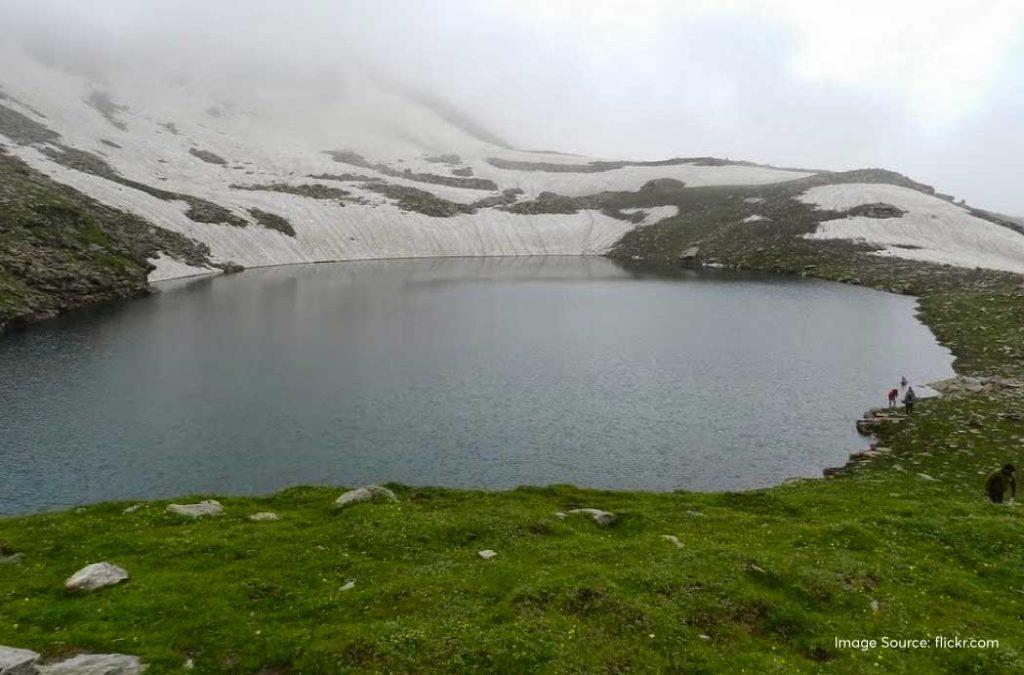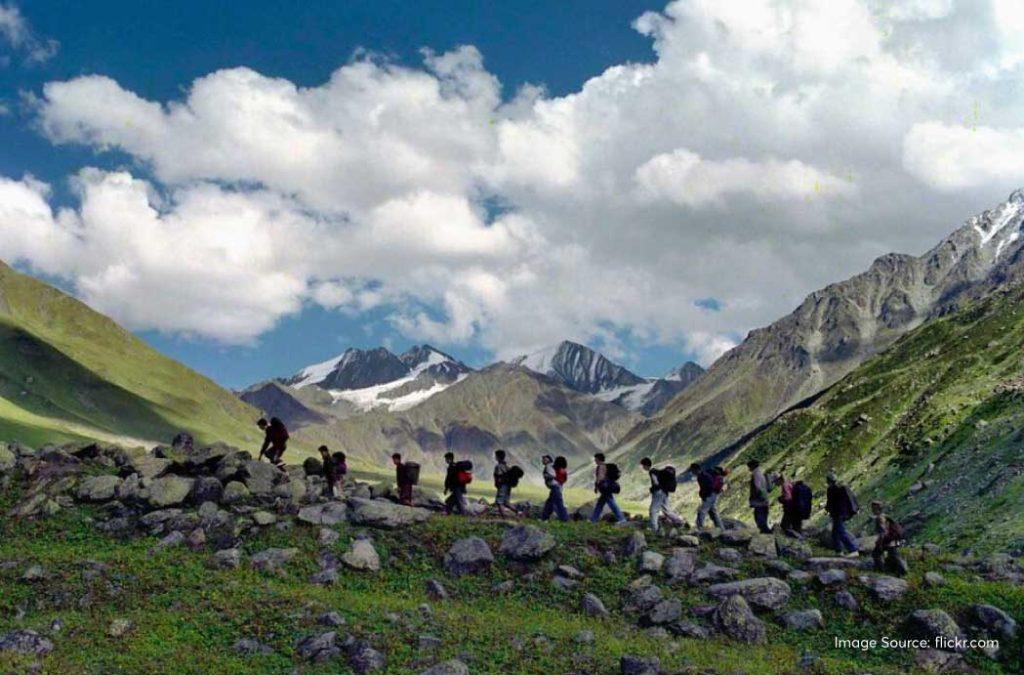Do you know? People say that the mountains whisper the tales of the past in the ears of the souls who venture on exploring them. Trekkers vouch for this fact! Beneath the cerulean canvas of the endless skies, you can pick up a stick and ascend to some of the highest points that Himachal Pradesh can offer. Treks in Himachal are exhilarating, beautiful beyond words, and give you a memorable experience. They are accomplishments that will make you smile for the rest of your life.

Some trekkers would go ahead and call these stunts their personal addiction! Once you set out on the journey of trekking, there is no looking back. You will always want to return to the comfort of the mountains, take in the ethereal gorgeousness of these lofty structures and eventually complete another trekking milestone!
Planning to take up the challenge? Then pick one of the routes from this list of the 10 most sought-after treks in Himachal. While you are in ‘Dev Bhoomi’, book your stay at Hotels to have an elevated travel experience!
Read on to find out about the treks in Himachal Pradesh.
Also Read: BEYOND THE GEOGRAPHY TEXTBOOKS: 12 ASTOUNDING NATURAL WONDERS IN INDIA
Exhilarating Treks in Himachal Pradesh
1 – Hampta Pass Trek

If it is one of your first treks in Himachal, you must take the Hampta Pass route. It is an easy path to embark on, but with surpassable challenges here and there that are absolutely thrilling. You will begin your journey from the verdant Kullu Valley and complete the trek in the arid landscapes of Lahaul. Now, that is a dramatic transition that you will definitely love to witness. Trekkers enjoy the wide-spread visages of apple orchids, lush greenery, pine forests, and exotic bushes. You will also come across Chandratal, a moon-shaped lake amidst the mighty Himalayan ranges. As you move ahead, the topography changes gradually and you’ll notice shifting from the flat grounds to upward ascent. Seeing how this change is not abrupt, the Hampta Pass Trek is ideal for beginners who want to explore trekking.
Duration: 4-5 days
Difficulty Level: Easy to Moderate
2 – Kheerganga Trek

The Kheerganga trek is one of the most well-known treks in Himachal and is the optimum choice for beginners and seasonal trekkers. Nature lovers always come back to embark on this route every year! Starting from the village of Barshaini, the trail winds through dense forests, charming villages, and picturesque landscapes, ultimately leading to the stunning meadows of Kheerganga which is 13,000 feet above sea level. The highlight of the trek is the natural hot water springs at Kheerganga, where trekkers can relax and rejuvenate amidst the serene surroundings. The Kheerganga Trek is not just about reaching the destination but enjoying the journey while you go from one milestone to the other. On your way, you get to enjoy the beauty of parvati valley and familiarise yourself with the local culture of the native Himachali villages.
Duration: 2-3 days
Difficulty Level: Moderate
3 – Bhrigu Lake Trek

The Bhrigu Lake Trek is one of the most sought-after high-altitude treks in Himachal. It gets its name from Sage Bhrigu, who is said to have meditated near the lake. This trek offers a unique blend of alpine meadows, lush forests, and mesmerizing views of snow-capped peaks. You will be starting your journey from the Gulaba village and taking a detour toward dense pine and oak forests. Lastly, you will be passing through the barren terrains, devoid of greenery before heading back to your starting point – Gulaba. The lake is situated at a height of 14100 feet and you will also be able to get a glimpse of the Hanuman Tibba and Seven Sister ranges. Now, isn’t that fascinating!? You can also click pictures of hanging glaciers and interact with the Gaddi shepherds while you move toward the ethereal lake.
Duration: 4-5 days
Difficulty Level: Moderate
4 – Chandrakhani Trek

If you want to explore some of the hidden treks in Himachal, then you must set out on Chandrakhani Trek. Though it is not completely secret, you will find lesser groups coming to take up the challenge. You will be starting from Naggar village and passing through dense oak forests, greeting the deodar trees, and gradually ascending to an impressive altitude of 18000 feet above sea level. From here, you will get a stunning 360-degree view of the surrounding Himalayan ranges. You can also get a peek at the Deo Tibba and Peer Panjal ranges. You will start your descent from Malana village, which is one of the major tourist-explored villages in Himachal. It is known for its distinct culture and close-knit communities. You will complete the trek at Jari and once you reach that final spot, you’ll feel like you had conquered the world!
Duration: 4-6 days
Difficulty Level: Moderate to Hard
5 – Sar Pass Trek

If you are coming to Kasol for a vacation, consider going on the Sar Pass Trek as well. Sar Pass is popular as one of the most enchanting treks in Himachal because of its mesmerizing panoramic visages. On the initial part of the trip, you will say hello to some of the most scenic meadows, awe-inspiring landscapes, and exotic wildflowers. The trek is a tad bit challenging but the stunning view of the cascading waters of Parvati Valley, Rhododendron and Oak forests will make everything worthwhile. You also get the chance to interact with the local people in the Himachali villages along the way. Seeing how the trek is not easy, you can consider yourself a champion after completing the journey of the trek.
Duration: 5-6 days
Difficulty Level: Moderate to Hard
Adventure lovers may also like to read: HIMALAYAS TO THE GHATS: 15 EPIC BIKE RIDES IN INDIA FOR ADVENTURE SEEKERS
6 – Bhaba Pass Trek

Phew! Bhaba Pass Trek is for those adrenaline junkies who want to sweat even when the temperature dips low amidst the mountains. It is one of the most popular treks in Himachal, especially among the frequent trekkers. Seasonal enthusiasts may not hear about it because the path can be a tad bit tricky. The entire trial will offer you the best breathtaking panoramic views of the Himalayas. You will also come across the Kungri, Ki, and Tabo Monasteries on your way. If you are interested in Tibetan Buddhism, then you must make pitstops at these spiritual abodes. What makes this trek special is the best views of apple orchids, turquoise lakes, and majestic peaks of the Spiti Valley. Guess what? You will also be passing by the Chadratal Lake and Pin Parvati Pass. You will be taking multiple breaks so while you are at it, relax for a while and take in the awe-inspiring beauty of the Kinnaur valleys.
Duration: 8 days
Difficulty Level: Hard
7 – Beas Kund Trek

If you are visiting Manali, then you must take time out to visit the point from where the cascading Beas River originates. The Beas Kund Trek is one of the most fascinating treks in Himachal, owing to its short route that will take you toward the biggest and most magnificent mountains of the Himalayas at 12,700 feet above sea level. The topmost point is where you will see the Beas glacier which is the source of the Beas River. The journey typically starts from the base camp at Solang Valley and ascends gradually to Beas Kund, passing through places like Dhundi and Bakarthach, showcasing the region’s natural beauty and high-altitude ecosystem. The Beas Kund Trek is a favourite among both novice and experienced trekkers due to its moderate difficulty level and the opportunity to witness the raw beauty of the Himalayas. You will be able to see Hanuman Tibba, The Seven Sisters, Friendship Peak, and Shitidhar. This is one of the most sought-after treks in Himachal during the summer season.
Duration: 4 days
Difficulty Level: Moderate to Hard
You May Also Like to Read: A SLICE OF MOUNTAIN PARADISE: 15 MOST INTRIGUING THINGS TO DO IN JAMMU
8 – Deo Tibba Trek

The Deo Tibba Trek is one of the recently discovered routes for trekking in Himachal. However, it is slowly gaining popularity because of its breathtaking views and awe-inspiring locations. You will be looking at some of the best mountain peaks and dining under the stars, within the comfort of your camps. Who wouldn’t want to experience that bliss? Starting from the village of Jagatsukh near Manali, the trail gradually ascends through lush forests, charming meadows, and alpine pastures. Trekkers get to witness the transformation of the landscape as they move from the dense forests to the higher altitudes. This path will take you through picturesque campsites like Chhika, Seri, Tenta, and Mini-Chandratal, offering breathtaking views of towering snow-laden peaks, cascading waterfalls, and vibrant wildflowers.
Duration: 4-5 days
Difficulty Level: Easy to Moderate
9 – Prashar Lake Trek

Don’t want to go too far up and have very little time on your hands? Then you must explore one of the shortest but also the most spectacular treks in Himachal – The Prashar Lake Trek. It will take you to a height of about 8900 feet above sea level and requires only two days. You will be starting from the village of Baggi and entering the zone of dense forests. The path is not very strenuous so you won’t be feeling as much physical strain as the other treks. On your way, you can see the wide-spread views of Dhauladhar, Pir Panjal, and the Kinnaur mountains. Once you reach Prashar Lake, the time stops and you can embrace the calm and serenity of this place. You can tent here beside the lake with the floating island and enjoy a hot cup of beverage or cook yourself the ‘Pahadi Maggi’. The descent is equally easy so beginners can take up this challenge without any hesitation.
Duration: 2 days
Difficulty Level: Easy
10 – Triund Trek

Triund is one of the most famous treks in Himachal and also the most preferred by beginners and seasonal trekkers. This path is the tester package that will let you know if you are ready to take up a harsher trekking challenge. The journey begins from McLeod Ganj and gradually proceeds toward Triund which is at an elevation of 9400 feet. You will be walking throw pine forests and rolling meadows. You need to keep your eyes open for the Triund Ridge that overlooks the Dhauladhar range. Trekkers can camp at Triund overnight, enjoying the starry skies and a serene sunrise over the mountains. Or else you can begin with the descent on the same day or continue further to Lahesh Caves or Indrahar Pass for a more challenging adventure. This is one of the most popular day treks in Himachal and you can complete the ascent in about 6 hours depending upon the weather conditions.
Duration: 1 day (overnight stay if you prefer)
Difficulty Level: Easy to Moderate
Trekking will introduce you to a world unlike any other you have seen. It is how you can tap into your inner self and appreciate yourself as being a part of nature. Throughout your journey, your breathing is the only prominent sound you’ll hear. Adding to that is the symphony of the breeze, the rustling of the leaves, and the swaying of the trees. The hues of green blend beautifully with the pristine white of the snow. Your body’s heat feels comforting against the chilly cold of the higher elevation.
Your legs would want to give up along the way but push yourself harder. Try to get to that summit because that feeling of accomplishment will set out the firecrackers of happiness in your heart. Enjoy the journey and embrace nature at its purest!



















